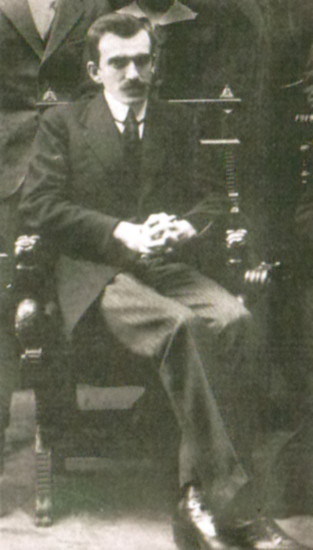Shulhyn, Oleksander
Shulhyn, Oleksander [Шульгин, Олександер; Šul’hyn] (Choulguine, Alexandre), b 30 July 1889 in Sokhvyne, Poltava gubernia, d 4 March 1960 in Paris. Political leader, community and cultural activist, historian, and sociologist; full member of the Shevchenko Scientific Society from 1948 and the Ukrainian Academy of Arts and Sciences; son of Yakiv Shulhyn. He studied history and philosophy at Saint Petersburg University (1908–15) and worked there until 1917. He joined the Saint Petersburg branch of the Society of Ukrainian Progressives and became a member of the central committee of the Ukrainian Democratic Radical party (UDRP) and a delegate to the Soviet of Workers’ and Soldiers’ Deputies.
Returning to Kyiv after the February Revolution of 1917, Shulhyn was elected to the Central Rada and its Little Rada. From July 1917 to 30 January 1918 he served as general secretary for nationality (later international) affairs. He was a coauthor of the Statute of the Higher Administration of Ukraine and a co-organizer of the Congress of Peoples of Russia in Kyiv (held September 1917). During his tenure as director of foreign policy Great Britain and France officially recognized the Ukrainian National Republic, and Ukraine began peace negotiations with the Central Powers in Brest (see Peace Treaty of Brest-Litovsk). Under the Hetman government he worked in the Ministry of External Affairs of the Ukrainian State, and from July 1918 to the end of the year he was Ukrainian ambassador to Bulgaria. In 1919 the Directory of the Ukrainian National Republic appointed him as a delegate to the Paris Peace Conference, and in 1920 he was head of the Ukrainian delegation to the first assembly of the League of Nations in Geneva. From 1921 he headed the UNR extraordinary diplomatic mission in Paris.
From 1923 to 1927 Shulhyn lived in Prague, where he was a professor of history and the philosophy of history at the Ukrainian Free University and the Ukrainian Higher Pedagogical Institute, and head of the Prague committee of the renewed Ukrainian Democratic Radical party (see Ukrainian Party of Socialists-Federalists). In 1926 he became minister of external affairs of the Government-in-exile of the Ukrainian National Republic and director of its foreign policy (1926–36, 1939–40, and 1945–6).
In 1927 Shulhyn moved to Paris. There he served as head of the Supreme Emigration Council (1929–39), head of the Government-in-exile of the Ukrainian National Republic (1939–40), and coeditor of the weekly Tryzub (editor in 1940). From 1933 to 1938 he protested against the Bolshevik terror, forced labor, and the Famine-Genocide of 1932–3 in the Ukrainian Soviet Socialist Republic. In an open letter to Fridtjof Nansen, published as the brochure La Société des Nations et les réfugiés ukrainiens (1929), he petitioned for the official recognition of Ukrainian refugees. During the German occupation Shulhyn was arrested in Paris (1940–1) as a Ukrainian pro-French political activist. After the end of the Second World War in 1945 he devoted himself to scholarly work. He founded and headed the Ukrainian Academic Society in Paris (1946–60) and initiated the International Free Academy of Arts and Sciences (vice-president in 1952–60). He was also the Ukrainian representative in the International Refugee Organization (1948–52) and a consultant to French organizations for the protection of refugees and stateless persons (1952–60).
Shulhyn wrote a number of studies about Ukraine’s struggle for independence (1917–20) and the activities of the Government-in-exile of the Ukrainian National Republic, including Polityka (Politics, 1918), L’Ukraine, la Russie, et les puissances de l'Entente (1918), Les problàemes de l’Ukraine (1919; also in English, Dutch, and Hungarian [1920] editions), Chronologie des principaux événements en Ukraine, 1917–19 (1919), L’Ukraine et le cauchemar rouge: Les massacres en Ukraine (1927), Derzhavnist’ chy Haidamachchyna? (Statehood or Haidamaka Insurgency?, 1931), Bez terytoriï (Without a Territory, 1934), and L’Ukraine contre Moscou, 1917 (1935; English trans 1959). Among his sociological and historiographic works are Narysy z novoï istoriï Evropy (Essays on Modern European History, 1925), Uvahy do istoriï rozvytku ranishn’oho kapitalizmu (Remarks on the History of the Development of Early Capitalism, 1928), Les origines de l'esprit national moderne et J.-J. Rousseau (1938), L’histoire et la vie: Les lois, le hasard, la volonté humaine (1957), and Michel Hrouchevskyj et sa conception de l'histoire de l'Est Européen (1959). He also contributed to émigré encyclopedias of Ukraine (Ukraïns’ka zahal’na entsyklopediia and Entsyklopediia ukraïnoznavstva) and various journals and anthologies, including Tryzub, Prométhée (1926–38), La Revue de Prométhée (1938–40), and Ukraïns’ka literaturna hazeta (1956–60). A biography of Shulhyn, in French, was edited by O. Perrin (1961), and a festschrift in his honor was edited by Volodymyr Yaniv (ZNTSh, no. 186 [1969]).
Arkadii Zhukovsky
[This article originally appeared in the Encyclopedia of Ukraine, vol. 4 (1993).]

.jpg)
